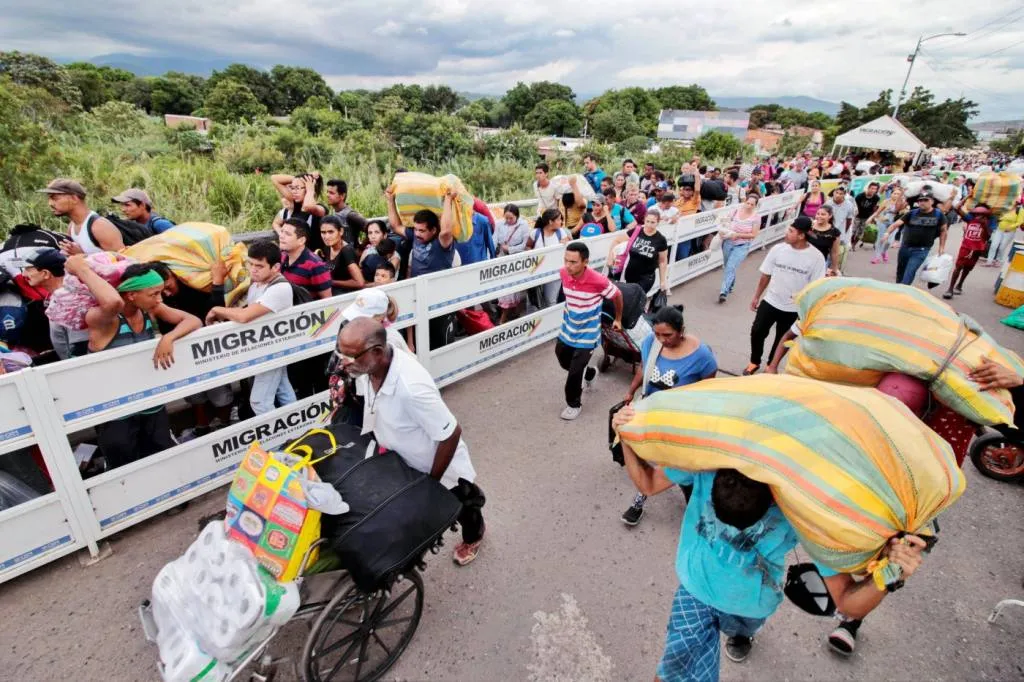Migration phenomenon and its cultural effects
The phenomenon of Migration has existed since the world is world. It is no secret to anyone that individuals and entire families migrate to other countries in search of new opportunities. If you want to know more about this phenomenon, we invite you to continue reading this article.
Migration Phenomenon
Migration Phenomenon : It has been said that it is, and will continue to be, the greatest global phenomenon of the last century. Individuals come and go throughout the continent, in currents that will not stop and that politicians use in their speeches promising things for the people if they are elected, however, these promises never materialize.
The phenomenon of migration is nothing more than the displacement of individuals or a group of them to a place other than where they were born and have resided throughout their lives. This displacement anomaly can be studied from different points of view:
For example, according to currents, political positions, from the point of view of a migrant or non-migrant, from a native or hybrid approach, from the countryside or from the city, from a needy person or from a wealthy person, among others. .
The phenomenon of Migration does not distinguish color, race, gender, social or economic condition, it affects us all equally and no one is exempt from having to resort to aspire to a better future and better living conditions.
Absolutely no one can deny that the phenomenon of Migration is part of our daily existence. Obviously, for a person to decide to migrate there must be reasons that lead to it and that should be a reason for occupation of each of our nations.
The migration phenomenon is a reflection of the withdrawal sketches coming from the groups of the power of the day:
- continuously established policies
- The domains of developmental currents
- The trend of neoliberalism
- The predominance of a homogenizing and Castilianized education
That over time they generated consumerist, competitive and destructive societies for themselves.
Faced with the phenomenon of Migration, only “the strongest survives”, there is no compassion or support, but rather unhealthy competition and showing that we are more apt by making others look bad, is like a kind of jungle where we seek to destroy each other.
Societies do not form individuals capable of creating things by themselves, being leaders, but rather, create individuals dependent on dynamics of progress that does not exist, is unreal but makes us feel the need that if we give in to the phenomenon of Migration , perhaps, we will find new and better opportunities.
The dependency or containment is born as a consequence of the directionality offered by its politicians. For example, in many countries, governments play the role of “Father” where they offer “social changes”, that is, supposedly better living conditions, better jobs, and opportunities.
However, in reality, these promises are never fulfilled and a dependency transformation only begins where the state gives me a small part of what I need to survive and people begin to alienate themselves to this new way of living, where being needed and depending is part of everyday life.
In reality, many governments are not interested in the real welfare of their nations, but rather that they depend on them and are not aware of developments and the meaning of a true quality of life offered by more prosperous countries such as the United States or the Spanish continent. .
In addition to the obvious changes in our mental patterns, the phenomenon of migration generates an impoverishment of our communities and indigenous entities in our countries.
Hardship, poverty, hunger, deplorable living conditions, the impossibility of their governments to offer real solutions or the satisfaction of their basic needs, are the greatest motivations for the phenomenon of Migration to occur .
Just as we cannot deny the phenomenon of migration, we cannot deny that many migrants have managed to stand out economically, build spectacular residences, acquire the latest model cars and build that better future that they went out to look for.
In most cases, this requires initial sacrifices such as spending little time at home, having several jobs, receiving mistreatment or lack of pay, among others, however, we must bear in mind that every start is difficult, but if we are persevering and we do not lose the north, we can achieve our dreams materialize.
Migration around the world
According to the United Nations the figures are alarming. For 2005, one hundred and ninety-one million (191,000,000) international immigrants were registered, that is, three percent (3% of the world population).
Almost half of these migrants are women and six out of ten migrate in search of “better wages” that allow them to enjoy quality of life and not survive day to day.
What are the types of human migration?
The phenomenon of migration has various types, which in turn, are perceived or explained more extensively in the causes of it. Among the types of migration we can highlight:
- Depending on their geographical scale, they can in turn be internal (within the same country) or external (in a country other than their origin).
- According to their origin or destination, for example, from the countryside to the city, in search of better living conditions.
- Depending on the degree of freedom, here we can include economic causes, political persecution, among others.
- According to the period of time, employment opportunities for a certain time and then return to the country of origin.
- Depending on age, for example, child migration normally occurs with their parents, but there are more extreme cases such as catastrophes or a war that require the immediate migration of the minor.
Causes of Migration
The causes that lead to the phenomenon of migration are usually very varied and in many cases, complex and hard to assume, below, we explain the causes of force majeure that force people to migrate:
Policies
One of the main causes of the phenomenon of migration . These can force a citizen to migrate to another country almost unexpectedly due to persecution or reprisals of a political nature.
Losing one’s life is a latent risk when there are totalitarian regimes: political exiles, harassment in their own homeland, as well as in the case of Spaniards fleeing post-civil war persecution or Europe when it reached its highest migratory point in 2015 from women and children by internal political confrontations.
Cultural
Culture (worship, dialect, traditions, customs…) is an important point to analyze before making any migratory decision, it depends on whether we can quickly adapt or feel comfortable.
Training possibilities, transfer, housing, are also very significant when making such an important decision.
Socioeconomic
Another of the main causes that promote the phenomenon of migration are sociocultural, that is, the fact that our salary is enough for us to live a decent life, allows us to acquire goods and services, our basic needs are covered, among others.
Scarcity is a phenomenon that emerges to a greater or lesser extent based on the production of a country and characterizes us as a nation. The submission of a people and the control of food can generate scarcity and inflation without actually existing, but by mere speculation.
Many merchants are based on the product-demand relationship to define the cost benefit, so they play with this in their favor, using the needs of their brothers to survive.
When a government does not meet the basic needs of their nations, people are forced to think selfishly and think about how I can do to keep my business active or simply work to lose and finally go bankrupt, and obviously, this is not The first option.
There is a direct relationship between socio-economic progress and immigration, and therefore, between underdevelopment and the phenomenon of migration .
As individuals, we will always seek to be where we have better living conditions, job offers, and even the power to build families.
Most of the people who migrate do so for financial reasons, fleeing poverty, seeking access to work, a better standard of living or, in more critical cases, for conservation issues.
Hunger and misery in many underdeveloped countries force many emigrants to risk their lives (and even lose them) in order to get out of their situation.
relatives
Family relationships, as well as their breakdown, are also important causes in the decision to emigrate. Family separation, in many cases, can initiate child migration.
child migration
The main causes of this fact are:
- Family members who have already migrated.
- The ambition of the parents to want to have an excellent financial level for the family (the majority only live with the mother, who often has several children).
- The search for a better quality of life (economy) by their parents or dependents.
Causes of war and other international conflicts
These constitute an immediate need to migrate compulsorily: persecution, massive population transfers, annihilation, wars, among others.
The Second World War in Europe (and also in Asia), as well as subsequent wars in Africa (Uganda, Biafra, Sudan, Somalia…) and in other parts of the world, have caused large population displacements or “forced migrations”.
Widespread catastrophes
Magnanimous earthquakes, prolonged droughts, floods, tsunamis, cyclones, infections, pandemics, among many other calamities of a social nature or a mixture of both, have caused millions of people to give in to the phenomenon of migration .
These can also be considered forced migrations, since they bring with them scarcity, calamity, famine, mass deaths, among others. Obviously, they are more difficult to assume in rural areas or underdeveloped countries, however, it does not exclude developed countries or large metropolises from being greatly affected.
What consequences does the phenomenon of migration generate?
The consequences of the phenomenon of migration are varied, below we detail each of them:
Low wages and instability
The phenomenon of migration has generated a significant reduction in wages worldwide, in addition to an unstable working life. For migrants, life in another country is not easy, in most cases they are hired because they are considered “more accessible labor.”
While they legally obtain their work license, they may be exposed to irregular pay without the right to claim, as well as humiliation and mistreatment due to their foreign status.
Job instability and abuse and exploitation in them can have serious consequences for the individual such as depression and in more extreme cases, suicide.
Isolation
Migrating is not easy, much less when in the country there are so few people who come from their homeland, this makes the individual have an isolated and lonely life or only share with the few who speak the same language.
Although the scenario is quite sad, we must always consider that this is something that we will face if we decide to emigrate, however, our motivation must be to obtain that better quality of life to which we aspire.
When the country does not cooperate in the insertion of immigrants, they generate their own communities, unfortunately, in many cases they end up forming “ghettos” (gangs).
Racism and discrimination
As we mentioned at the beginning of the causes of the phenomenon of migration , as immigrants we are exposed to being singled out, mocked and humiliated for being foreigners.
Each country should generate a tolerant conscience towards these people who in most cases just want better living conditions; residents of the country may feel threatened by these foreigners expressing racism and rejection towards them.
health deficit
When we migrate to more developed countries, it is logical that there will be better health systems, however, due to regulations for the regularization of legal documents, as foreigners, we can be left unprotected, denying ourselves the right to receive medical care.
Limited public health services or internal reasons can only generate or increase anxiety.
education deficit
The phenomenon of forced migration of a family can generally generate the temporary or permanent interruption of the children (children or adolescents).
Some young migrants are lucky and have the chance to enter and adapt to a new educational system, however, having to adapt is not easy, so in many cases they drop out and start looking for job opportunities.
Migration phenomenon : In many countries, completing a degree is quite expensive, so they must work to help their families and, in turn, contribute to their studies, in most cases, they must end up abandoning their training and devoting himself to work in order to survive.
Dependence and loss of freedom
Feeling that we must abandon our family and friends from the country where we were born and grow up is not easy at all, but adapting to a world of work whose laws are unknown is not easy either, so these are factors that generate almost absolute dependence. with the new employers.
This “new reality” brought about by the phenomenon of migration generates in many migrants a state of low self-esteem that prevents them from seeing and demonstrating their true abilities and talents, limiting themselves only to obeying, following orders and doing their job.
Many individuals become workers with high economic and emotional dependence, as well as giving up their freedom in exchange for a salary.
Illegality and mafias
The phenomenon of migration , whether voluntary or forced, extends the possibility of legalizing the state of residence, making people seeking a new life more vulnerable.
The eagerness or illusion of many migrants to show others that they have achieved the long-awaited success that made them leave their lands makes them perfect victims for mafias and illegal businesses.
Obviously, a person who is ignorant of the laws, does not know others, and has an urgent need to make money quickly, is perfect for these bandits.
Loss of the concept of nation
The phenomenon of migration beyond its processes, documents, legalization, among others, goes beyond borders, they share the same feeling: better quality of life.
If the new country receives us in a good way, this will generate a sense of belonging, we will acquire its customs, so that with the passage of time we can lose the notion of origin, our way of expressing ourselves or living.
However, even if we manage to achieve that better quality of life, we must not forget where we come from and be grateful for every opportunity and every person who accompanied us in each process.

Hello! Let me enthusiastically introduce myself as a dedicated blogger fueled by an intense passion for meticulously crafting insightful and well-researched blogs. My mission revolves around providing you, dear readers, with a veritable treasure trove of invaluable information.






